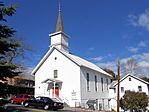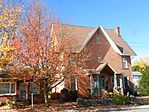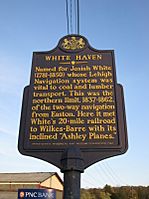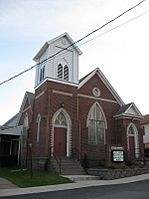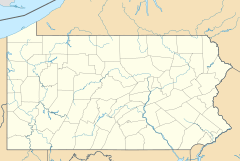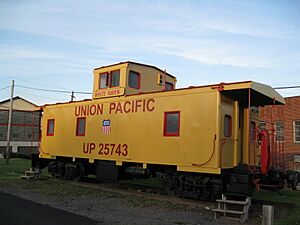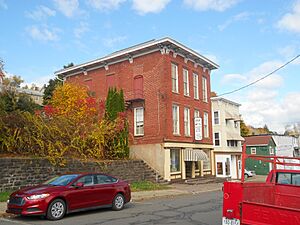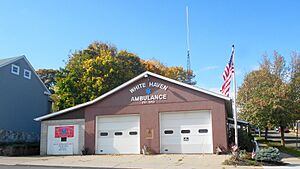White Haven, Pennsylvania facts for kids
Quick facts for kids
White Haven, Pennsylvania
|
|
|---|---|
|
Borough
|
|
|
From top, left to right: A Presbyterian church, a house in the borough, White Haven historical marker, a church in the borough
|
|
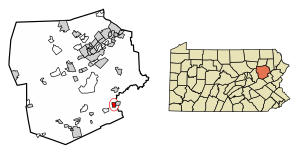
Location of White Haven in Luzerne County, Pennsylvania (left) and of Luzerne County in Pennsylvania (right)
|
|
| Country | United States |
| State | Pennsylvania |
| County | Luzerne |
| Settled | 1865 |
| Incorporated | 1842 |
| Government | |
| • Type | Borough Council |
| Area | |
| • Total | 1.23 sq mi (3.19 km2) |
| • Land | 1.20 sq mi (3.11 km2) |
| • Water | 0.03 sq mi (0.08 km2) |
| Elevation | 1,221 ft (372 m) |
| Population
(2020)
|
|
| • Total | 1,166 |
| • Density | 971.67/sq mi (375.20/km2) |
| Time zone | UTC-5 (Eastern (EST)) |
| • Summer (DST) | UTC-4 (EDT) |
| ZIP Code |
18661
|
| Area code(s) | 570 |
| FIPS code | 42-84552 |
White Haven is a small town, called a borough, in Luzerne County, Pennsylvania, USA. It sits right next to the Lehigh River. In 2020, about 1,163 people lived there.
Contents
A Look at White Haven's Past
How White Haven Started
White Haven was founded in 1824 by a businessman named Josiah White. It officially became a borough in 1842.
Coal Mining and Trains
Long ago, explorers in the Wyoming Valley found a special type of coal called anthracite. This coal was very common in the Coal Region. At first, people didn't know how to use it well.
On February 11, 1808, a judge named Jesse Fell from Wilkes-Barre created a special iron grate. This grate helped people burn anthracite coal successfully for the first time. This invention made anthracite coal very popular for fuel. It helped the coal industry grow a lot in Northeastern Pennsylvania.
During the 1800s, workers built canals and railroads. These were used to help mine and move the coal. The population in Luzerne County grew quickly because of the expanding coal mining industry.
The Lehigh Coal and Navigation Company started the Lehigh and Susquehanna Railroad in 1837. Their goal was to connect Wilkes-Barre to White Haven. Building the railroad began in 1839 and finished in the 1840s. The route was about 19.58 miles long and very difficult. It needed a tunnel and three special inclined planes, like the famous Ashley Planes.
When the Lehigh and Susquehanna Railroad was finished, the canal system quickly became less important. The railroad could move anthracite coal from the Wyoming Valley's coal fields to White Haven. It crossed the Appalachian Mountains, which had been a big challenge for settlers for 150 years.
Once the Lehigh and Susquehanna Railroad reached White Haven, a large transportation system was in place. This system quickly and cheaply delivered the Wyoming Valley's coal to people who wanted to buy it. By 1867, the Lehigh Valley Railroad connected to Wilkes-Barre. Then, in 1869, it linked up with other train systems in New York state.
Where is White Haven?
White Haven is located at 41°3′34″N 75°46′34″W / 41.05944°N 75.77611°W. It is about 17 miles south of Wilkes-Barre. It is also about 4 miles west of where two major highways, I-476 and I-80, meet.
The U.S. Census Bureau says White Haven covers about 3.2 square kilometers. Most of this area is land, and a small part (about 2.12%) is water. White Haven is about 1,221 feet above sea level.
Fun Things to Do
Lehigh Gorge State Park is a great place for outdoor activities. It includes the Lehigh River. The park offers many fun things for people in White Haven and nearby towns.
When water is released from the Francis E. Walter Dam, the river becomes deep enough for boating. White water rafting is a very popular activity in the park. Other activities you can enjoy include fishing, hiking, bicycling, sight-seeing, and snowmobiling.
People of White Haven
| Historical population | |||
|---|---|---|---|
| Census | Pop. | %± | |
| 1860 | 943 | — | |
| 1870 | 1,321 | 40.1% | |
| 1880 | 1,408 | 6.6% | |
| 1890 | 1,634 | 16.1% | |
| 1900 | 1,517 | −7.2% | |
| 1910 | 1,438 | −5.2% | |
| 1920 | 1,402 | −2.5% | |
| 1930 | 1,537 | 9.6% | |
| 1940 | 1,528 | −0.6% | |
| 1950 | 1,461 | −4.4% | |
| 1960 | 1,778 | 21.7% | |
| 1970 | 1,203 | −32.3% | |
| 1980 | 1,218 | 1.2% | |
| 1990 | 1,132 | −7.1% | |
| 2000 | 1,182 | 4.4% | |
| 2010 | 1,097 | −7.2% | |
| 2020 | 1,163 | 6.0% | |
| 2021 (est.) | 1,164 | 6.1% | |
| U.S. Decennial Census | |||
In 2000, there were 1,182 people living in White Haven. There were 468 households and 329 families. The population density was about 982 people per square mile.
Most people in White Haven were White (98.39%). A small number were Native American (0.08%) or Asian (1.27%). About 0.76% of the population was Hispanic or Latino.
Many residents in 2000 reported their family backgrounds. The main ancestries were Polish (17%), Italian (13%), Irish (10%), Slovak (8%), and German (6%).
About 34% of households had children under 18 living with them. About 52.6% were married couples. The average household had 2.53 people. The average family had 3.06 people.
The population had a mix of ages. About 27.3% were under 18. About 16.5% were 65 or older. The average age was 37 years.
The median income for a household was $37,438. For a family, it was $43,846. The average income per person was $18,768. About 6.4% of the population lived below the poverty line.
Schools in White Haven
The schools in White Haven are part of the Crestwood School District.
Famous People from White Haven
- John J. Dempsey, a former governor of New Mexico
- Warren Newton Dusenberry, an educator
- Liz Lemon, a made-up character played by Tina Fey on the TV show 30 Rock
- Edith King, an actress
- Brad Kocher, a Major League baseball catcher
- Ron Mrozinski, a Major League baseball pitcher
- A. Mitchell Palmer, who was the Attorney General for President Woodrow Wilson
- Darin Young, a professional darts player
See also
 In Spanish: White Haven (Pensilvania) para niños
In Spanish: White Haven (Pensilvania) para niños
 | Sharif Bey |
 | Hale Woodruff |
 | Richmond Barthé |
 | Purvis Young |


